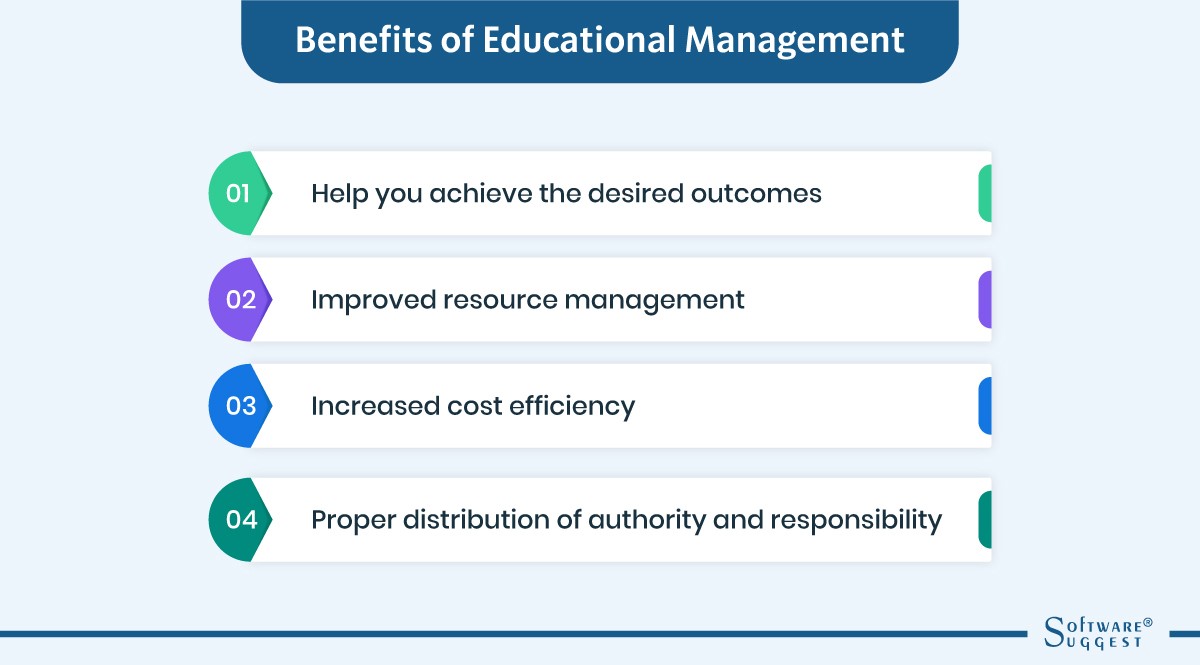Behind any educational institute's success and proper management of an educational institution, effective management plays a vital role to shape the learning environment and it also helps to make sure the success of different educational programs. In the below image, you can see the different kinds of benefits which educational management provides.

There are various types of educational management, each with its own characteristics and approaches. In this blog post, we will explore 4 major types of educational management. We will also get an understanding of these different approaches, so educators and administrators can make informed decisions to create a conducive learning environment for all stakeholders.
Before moving to the topic, can we ask you a question? Do you follow us on Social Media? We regularly share upgraded educational content, tips, feedback, and more. Check us out by clicking the profiles here - Facebook / Twitter / LinkedIn / Pinterest / Instagram / YouTube
So, without any further delay, let’s get started.
1. Centralized and Decentralized Educational Management
Centralized and decentralized educational management refers to the distribution of power and responsibility in educational administration, supervision, and control. In centralized management, all powers and responsibilities are vested in a single individual or institution. This type of management was prevalent in the past when education was primarily driven by kings and emperors. However, in the modern educational system, decentralized management is considered more effective.
Decentralized educational management involves the division and distribution of powers and responsibilities among different stakeholders. This approach ensures that everyone involved in the field of education, from the Director of Higher Education to the staff members of individual schools, actively participates, and takes responsibility for educational management. By decentralizing management, educational institutions can create a sense of ownership and accountability, leading to successful program implementation.
2. External and Internal Educational Management
The management of educational programs can be categorized as either external or internal. External management refers to elements, factors, and supporting agencies that indirectly contribute to the smooth functioning of educational programs. These include community members, specialists, experts, administrators, parents, supervisors, and other agencies. Their role is to create a suitable and supportive atmosphere, provide resources, and offer suggestions for program observation and participation.
On the other hand, the internal management of an educational institution involves individuals who are actively and directly involved in the management of educational programs. This includes the head of the institution, teaching personnel, non-teaching staff, and students. Internal management encompasses planning, organizing, coordinating, supervising, controlling, administering, and evaluating educational programs. The success of internal management heavily relies on the active involvement and dedication of these stakeholders.
3. Authoritarian/Autocratic Democratic Educational Management
Authoritarian or autocratic management centres around the centralization of power and control. In this type of management, decisions, and policies are planned and directed by a single individual or a group known as the "core group." This centralized approach allows for strict administration of laws, rules, and regulations, often leading to limited professional freedom for teachers. Authoritarian management is commonly found in totalitarian or unitary states, where the management of an educational institution are dominated by a central authority.
On the other hand, Democratic Educational management is the kind of management that aligns with the principles of democracy. It promotes the ideology of de-centralization and also promotes the rights and responsibilities of all the stakeholders who are involved in an educational institute. Democratic management fosters a collaborative environment that is characterized by mutual trust, cooperative planning, group discussions, and the participation of staff members.
Teachers also have the freedom to plan, administer, organize, direct, coordinate, supervise, control, and evaluate their assignments, leading to a more inclusive and successful educational management approach.
Let’s get to know the principal of Democratic Educational Management
Principles of Democratic Educational Management
In democratic educational management, several principles guide the decision-making process and the interactions among stakeholders:
1. Sharing responsibility
All individuals involved in the educational management process share the responsibility of their work.
2. Equality
Every stakeholder should be treated equally, ensuring equal access to facilities, rights, and opportunities.
3. Freedom
Individuals should have the freedom to fulfill their duties within their respective jurisdictions.
4. Cooperation
Collaboration and Cooperation between all the stakeholders within the educational institute are essential for successful educational management.
5. Creative Educational Management
Creative educational management is characterized by the unique approach and creative talents of the head of an educational institution. It involves utilizing creative abilities at all levels of the institution to ensure effective management of educational programs. This approach encourages innovation, problem-solving, and thinking outside the box. By embracing creativity, educational institutions can adapt to evolving needs and provide a dynamic and engaging learning environment for students.
Understanding of Different Types of Educational Management Is Essential
Every educational program and overall development of learners within an educational institute's overall success depends on one of the major factors which is effective educational management.
Those individuals who are associated with educational management and have pursued courses like Post Graduate Diploma in Educational Management know really well how they can make a positive impact by having a proper understanding of different types of educational management on the overall growth of the institute.
However, in this blog post also we have explained every type of educational management in detail, with which educators and administrators who are involved in management can take essential steps to provide quality education and empower students for a brighter future.
We believe education should be accessible for everyone. That’s why we don’t charge for our blogs. Find the right course that will help you in your career with us, contact us at - +91-6292137532. You can mail us at act@asiancollegeofteachers.com









